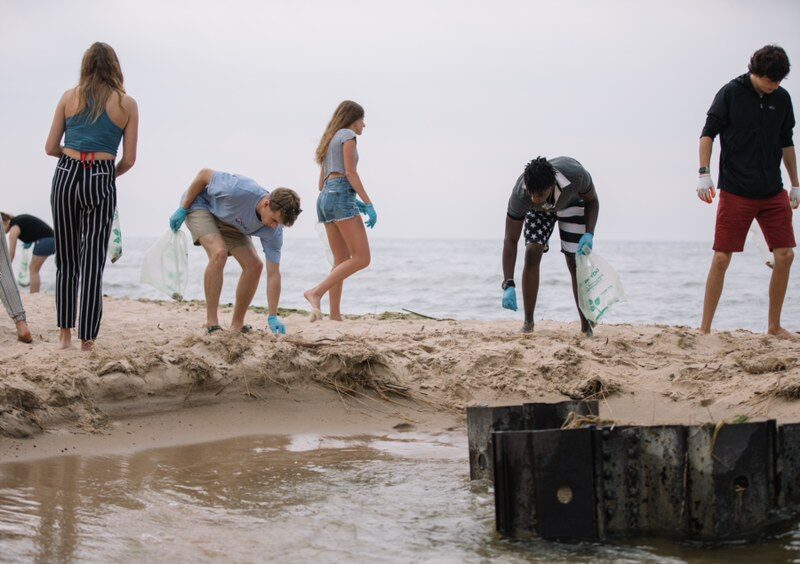
Community gathered on a Muskegon Pere Marquette Beach day clean-up and collected 43.5 pounds of waste. Credit: Personal archive
An early July morning. Fifty-five people of all ages. An hour-long cleanup of a two-mile stretch of Muskegon’s Pere Marquette Beach.
More Info
The result? Nearly 44 pounds of waste collected—half of it plastic that will be turned into sustainable clothing.
Behind this transformation was University of Michigan student Jackson Riegler, who defines himself as a “Great Lakes lover.” The 19-year-old is the founder of the first company to use 100% U.S. plastic to produce clothes: Oshki, which means “fresh,” in Native American Ojibwe. His ambition is to shift the fashion industry and help preserve the coast of Lake Michigan.
Riegler started the company two years ago, with four unisex shirt designs. He was a junior in high school and became aware of issues like pipelines, invasive species, plastic waste and the U.S. administration’s $3 million cuts in Great Lakes funding.
“I grew up by the shores of Lake Michigan in Muskegon and really wanted to do something to help preserve our water,” he said. “The Great Lakes are really special and tremendously important to Michigan and our country.”
Riegler, who is studying economics at U-M, recently launched the 1:1 Tee—named with a specific mission in mind: to prevent the prediction that the seas will have more plastic than fish in the near future. According to a report by the World Economic Forum and the Ellen MacArthur Foundation, the ratio between fish and plastic in Earth’s waterways is predicted to be 1:1 by 2050.
“This threat to the environment and to the lakes that I have always been passionate about inspired us to name our new collection,” Riegler said. “It is our commitment to end this possibility. What we do in the next few decades will shape the future of the human species.”
Oshki has sold about 350 of the new t-shirts, available in light blue and navy, since they became available for purchase in early June.
“I’m overwhelmed by the sales and extremely happy,” Riegler said. “I was able to reach this number because I had the money on hand to do the upfront inventory.”
This capital—$9,000—came from optiMize, a U-M student-led organization that offers workshops, mentorship and funding for students to create self-directed projects that make a positive impact.
“Besides the financial resources, optiMize has been really important to move my business forward,” Riegler said. “Their mentorship is inspiring me along the way. They believed in my vision since the beginning of this process. They really empower you and make you believe ‘Why not me?'”
Oshki’s supply chain now consists entirely in the United States, from resource extraction to packaging to final product. The company donates 5% of all profits to nonprofit groups working to preserve the Great Lakes, already totaling more than $1,200 in donations. Each month, after a final profit statement, Riegler donates to a local nonprofit organization.
“Every month I choose one nonprofit where I believe the money will be more beneficial,” he said. “I donate to different areas and companies to help maximize the impact of the money and because I don’t want them to become dependable on donations.”
Riegler is already working on the company’s new line of fully recycled clothing, including women’s leggings and men’s shorts.
“As plastic waste continues to build up domestically, we hope to inspire other companies to use U.S. plastic waste in their supply chains by taking charge as a leader in the industry and inspiring customers to live more sustainably.”


